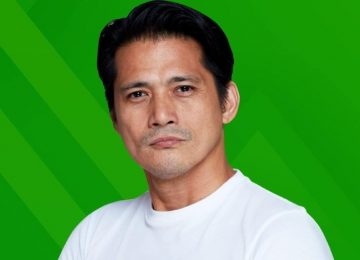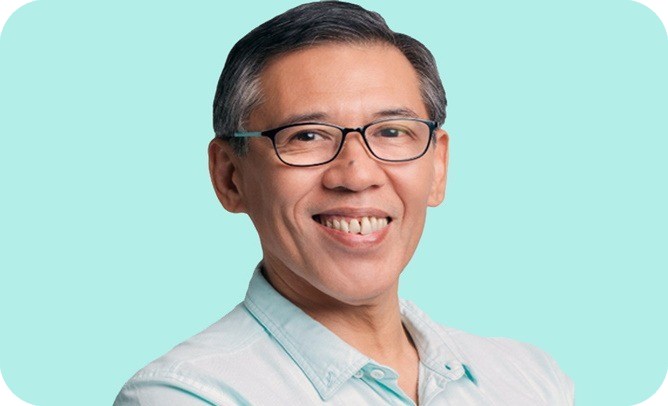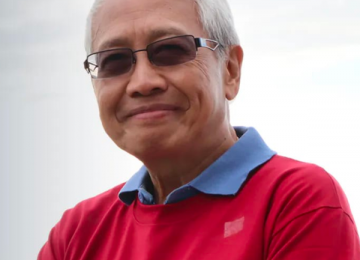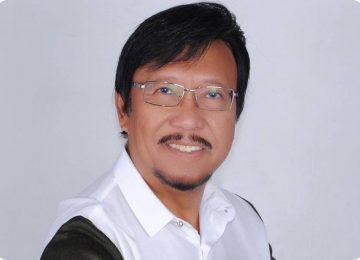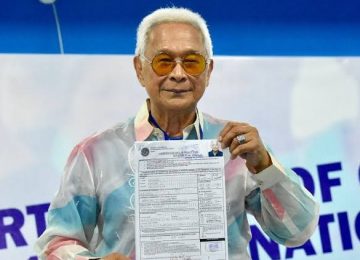Chel Diokno is a lawyer, educator, writer and human rights and justice advocate, who began his work in the late 1980s.
He served as a member of the presidential human rights committee, now the Commission on Human Rights, under former Presidents Corazon Aquino and Fidel Ramos and as a presidential adviser on human rights to the Integrated Bar of the Philippines from 2017 to 2019.
Chel Diokno also led the prosecution panel in the first impeachment trial against an elected president, Joseph Estrada, who was later ousted by the Second EDSA Revolution.
Since 2003, he has helmed the Free Legal Assistance Group which was co-founded by his late father Jose W. Diokno, a former senator and justice secretary, during Martial Law. FLAG’s clients include activists and victims of human rights violations, including alleged victims of the Duterte administration’s war on illegal drugs who the group represented before the SC, petitioning to have the campaign declared unconstitutional. The SC in 2019 ordered the government to submit the records and reports of the PNP investigations into about 3,800 deaths related to the assailed campaign to both the SC and the petitioners.
He also appeared before the SC as one of the 13 lawyers handpicked to argue the constitutional challenges brought by the 37 groups of petitioners against the Anti-Terrorism Act of 2020.
Diokno is a founding dean of the College of Law at De La Salle University and has been teaching law since the late 1980s, giving free legal and paralegal seminars and consultations for members of disadvantaged and indigent communities and training lawyers at various government agencies.
He previously ran for the Senate in 2019 under the opposition Otso Diretso slate, but only garnered 6,342,939 votes and placed 21st out of 62 candidates.
Diokno is running under the Katipunan ng Nagkakaisang Pilipino and has been included in the senatorial slates of the labor leader Leody de Guzman and Vice President Leni Robredo. He is also endorsed by the opposition coalition 1Samabayan.
He is campaigning primarily on reforming the judicial system, supporting ordinary workers and MSMEs, strengthening anti-corruption laws, improving public education, and transitioning the transportation sector to a “green” or more sustainable model.
“Sisiguraduhin natin na may pananagutan because it is my firm belief that it is the certainty of punishment that stops crime—dapat ‘pag may magsala ay may parusa. At syempre, hinding hindi tayo papayag na gagamitin ang batas para mang-api sa mga Pilipino.”
JOSE MANUEL “CHEL” ICASIANO DIOKNO
Full Name: Jose Manuel Tadeo Icasiano Diokno
Nickname: Chel
Birthday: February 23, 1961 (Age 64)
Birthplace: Pasay City, Metro Manila
Residence: San Juan City, Metro Manila
Languages Spoken: Filipino; English
Parents:
- Jose “Ka Pepe” W. Diokno (deceased), father, former senator and justice secretary
- Carmen Icasiano Diokno (deceased), mother
Siblings:
- Carmen
- Jose Ramon
- Pat Diokno
- Maris
- Maite
- Maria Socorro
- Jose Miguel
- Maria Victoria
- Martin
- Popoy Diokno
- Maria Serena Icasiano Diokno, former chair of the National Historical Commission of the Philippines
Spouse: Divina Aromin-Diokno; freelance writer
Children:
- Pepe Diokno, filmmaker
- Abe Diokno, entrepreneur & consultant
- Ian Diokno, student, independent music artist
- Julio Diokno, student
- Laya Diokno
- Inez Diokno, product designer (UX/UI)
Profession/Occupation: Lawyer
EDUCATION
- Admitted to the Bar, State of Illinois, USA, 1986
- Admitted to the Bar, Republic of the Philippines, 1988
- Juris Doctor of Laws; Northern Illinois University; 1986
- Bachelor of Arts in Philosophy; University of the Philippines – Diliman; 1983
WORK EXPERIENCE
- Presidential Adviser on Human Rights, Integrated Bar of the Philippines, 2017-2019
- Member, Panel of Arbitrators, International Centre for Settlement of Investment Disputes, 2015-2021
- Fiscal Autonomy Expert, Asian Development Bank Project on capacity development for members of the Constitutional Fiscal Autonomy Group, 2015
- Member, Supreme Court Core Committee of the National Conference for the Revision of the Rules of Civil Procedure, 2013
- Chair, Post-Trial Cluster Technical Working Group,2013
- Founding Dean, De La Salle University College of Law, 2010-2019
- Special Counsel, Board of Directors, Development Bank of the Philippines, 2004-2006
- Chairman, Free Legal Assistance Group, 2003-present
- General Counsel, Senate Blue Ribbon Committee (or the Committee on Accountability of Public Officers and Investigations), 2001-2004
- Member, Presidential Human Rights Committee (now, the Commission on Human Rights) under former Presidents Corazon Aquino and Fidel Ramos
- Solo practitioner, Diokno Law Office, 1988-1991, 2006-present
- Partner and Head of Litigation, Moncupa, Diokno & de los Reyes Law Firm (1996-2001)
PLATFORM AND POLICY
Judicial reforms:
- Give each Filipino access to free legal aid in their barangay by passing a law to strengthen the barangay justice system to:
- Ensure that the Lupon ng Tagapamayapa works efficiently and professionally
- Establish training centers for Lupon members, both for improvement of mediation, conciliation and arbitration skills and administrative skills
- Pay the Lupon members adequately
- Strengthen the Lupon by getting lawyers to train and guide them
- Provide adequate support for the Lupon’s logistical and administrative needs
- Strengthen anti-corruption laws to ensure that abusive public officials and law enforcement officers are held accountable
- Pass an alternative penalties act, which would allow courts to impose alternative penalties (such as community service, home detention, rehabilitation or treatment, suspended sentences and exclusion orders) for minor offenses
Covid-19 response:
- Pass a pandemic management law
- Reform the healthcare system
- Provide sufficient na benepisyo sa healthcare frontliners
Economic and climate justice:
- Support ordinary workers and MSMEs, through ayuda, unemployment insurance, business loans and modernized agriculture and local industries
- End of contractualization or endo
- Pass laws to provide sufficient and quality housing for the needy
- Pass an anti-discrimination law, to provide for equal access to education and livelihood
- Transition the transportation sector to a “green” or more sustainable and pro-user model, such as providing bike lanes, e-vehicles and wider use of renewable energy sources
Democratic institutions:
In his 2019 Senate campaign, he promised to:
- Push for transparency in the appointment of judges by the Judicial and Bar Council through prohibiting backers and having deeper background checks for any potential conflict of interest
- Propose legislation to make mandatory the publicizing of judges and justices’ SALNs
Independent and foreign policy:
- Protect the West Philippine Sea
MAJOR ACCOMPLISHMENTS
Public Office
Diokno has worn many hats in public service, acting as litigant, rule-maker and adviser.
He first served as a member of the presidential human rights committee under former Presidents Corazon Aquino and Fidel Ramos.
From 2000 to 2001, Diokno led the prosecution panel, composed of lawmakers and lawyers, in the first impeachment trial against an elected president. President Joseph Estrada was impeached over accusations that he amassed about P240 million from public funds and receiving bribes from jueteng lords. On the evening of Jan. 16, 2001, Diokno and the rest of the prosecution panel walked out of the impeachment court in protest of the 11-10 vote not to open an envelope allegedly containing incriminating evidence against the president. The televised protest triggered the street demonstrations dubbed as EDSA II and eventually led to President Estrada’s resignation on Jan. 20, 2001.
In February 2021, false stories circulated online alleging that Diokno was an “accomplice” of ABS-CBN in a scheme to evade paying taxes. The false claim apparently arose when, in one lower house’s hearings on alleged loan write-offs by Development Bank of the Philippines in favor of the network, Anakalusugan Party-List Rep. Michael Defensor read off names of attendees, including Diokno’s, in a 2004 DBP meeting on the supposed loan condonation.
Diokno admitted that he was a DBP consultant from 2004 to 2006 but said he only gave legal advice and had no decision-making power. Several members of Congress alleged that the country lost at least P1.6 billion after state-run DBP supposedly wrote off loans of the Lopez Group, which owns a big chunk of the network. DBP denied that condonation occurred, stating that the loans were sold to Lehman Brothers, an investment bank that collapsed during the 2008 global financial crisis. Lopez Holdings has maintained that it had paid all obligations with holders of the DBP loans.
Private Sector
Diokno was the founding dean of the De La Salle University College of Law and also taught at the Ateneo Law School.
For more than three decades, he has provided free legal and paralegal seminars and consultations for disadvantaged and indigent communities. He also gives legal training for government lawyers including the Department of Justice, the Office of the Ombudsman, the Commission on Audit and the Public Attorney’s Office.
Diokno has been the chairman of FLAG since 2003. He and other FLAG lawyers represented retired Davao City police officer Arthur Lascañas, who made the February 2017 public confession and accusation about the alleged Davao Death Squad killings ordered by then-Davao City Mayor Duterte. After Lascañas went into hiding, Diokno and FLAG lawyers petitioned the SC on behalf of victims of the Duterte administration’s war on illegal drugs to declare said campaign unconstitutional. In 2019, the SC ordered the government to submit the records and reports of the PNP investigations into about 3,800 deaths related to the assailed campaign to both the SC and the petitioners.
In 2019, during his first Senate campaign, Diokno and his co-counsels represented fishermen before the SC to ask for a writ of kalikasan to compel the government to preserve, restore and rehabilitate islands in the West Philippine Sea amid the dispute with China.
In July 2019, Solicitor General Jose Calida announced that 19 of the 40 fishermen had “disowned” the petition through sworn affidavits and in a video, supposedly after learning about the true nature of the case from watching the news and seeking help from the Philippine Navy’s lawyers. Diokno and his co-counsels were reprimanded by the SC after IBP counsel Andre Palacios admitted to not talking personally to any fisherman and Diokno said he had spoken with only three, since interviews were done by the local IBP chapter officers.
Diokno denied that they deceived the fishermen and blasted the government for talking to his clients behind his back to urge them to back out.
Amid Calida’s threats of disbarment charges, the IBP and Diokno withdrew the petition. The SC dismissed the petition and issued a stern warning to the lawyers that the commission of the same or similar infraction in the future would be dealt with more severely.
More recently, Diokno appeared before the SC as one of the 13 lawyers handpicked to argue the constitutional challenges brought by the 37 groups of petitioners against the Anti-Terrorism Act of 2020.
He has also been involved in non-litigation practice, serving as fiscal autonomy expert for the Asian Development Bank Project on capacity development for members of the Constitutional Fiscal Autonomy Group. He was also a member of the panel of arbitrators of the International Centre for Settlement of Investment Disputes from 2015-2021.
Diokno has written, edited and published articles and books such as, “The Model Pleadings of Jose W. Diokno (2020), “Civil and Administrative Suits as Instruments of Accountability for Human Rights Violations” (2010) and “Diokno on Trial: Techniques and Ideals of the Filipino Lawyer” (2007).

